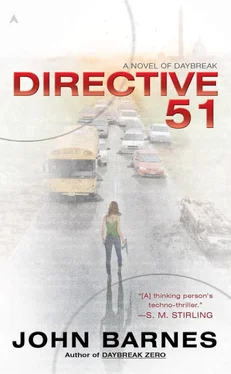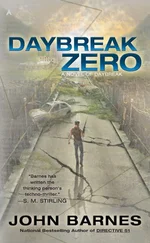“You don’t want me to try to bring Athens under our control. You don’t seem to be advocating that we surrender to them. And although ‘unite in favor of the elected government that will replace you both’ is a very nice sentiment in the long run, I don’t see that it tells me what to do this week. So let me put it squarely in your court. What should I do about the present circumstances?”
“Start with what you’re doing. Send Arnie and me to Pueblo, and give wholehearted support to the experiment, and if Cam is letting you have all those home-built radars, thank him and ask him for all the data he gets.” She leaned forward. “Expand my mission to the GPO in Pueblo, call it something like the Reconstruction Information Development Center, some broad title that lets us throw our weight behind everything that can re-unite the country, and put us in charge of getting every kind of information the country needs and getting it to everyone who needs it by every means we can. Support us as much as you can and challenge the boys in Athens to give us even more support, but let us have our independence from both of you.”
She had been surprised about her anger at Graham before, but she was double-surprised by her enthusiasm for an idea she had only thought of that moment.
He put his glasses on again, and said, “More beer for me. Do you want more juice? Pineapple again? Or I’m saving a couple small bottles of orange.”
“Whichever you’d rather give me. I take it we’re going to talk about the possibility of setting up what I have in mind for Pueblo rather than you pressing a button and bringing in people to straitjacket me and take me out the back way.”
“Yes we are.” He handed her another can of pineapple juice, opened a beer for himself, and said, “You’re behind the times, by the way. If I wanted you arrested and taken out privately, there’s no bell-and-buzzer system for me to use—too hard to maintain it. I’ve got a concealed string to a bell downstairs under my desk.”
She held the can of juice up in salute. “Modern times.”
“Modern times. May we get back to good old soulless technology as soon as we can.” They both drank reverently, savoring the remnants of the old civilization. “Actually I like what you’re proposing, but the name’s got to change—that acronym would pronounce like ridick , which would be an invitation for puns on ridiculous . We’ll call it the RRC, the Reconstruction Research Center—now there’s a golden expression, that’ll let you do anything. Anyway, a third power in the middle of the continent—one that has people’s loyalty but not an army—could be an honest broker we could call in for misunderstandings, and not only do a lot of good, but do it in a way that caused people to attribute it to the Federal government—basically build up a reserve of good will for that elected government in 2027. It would tend to keep Athens honest, and I’m sure they’d say it will help to keep Olympia honest. Maybe in the long run, it would be easier for both this government, and the Athens government, to gradually cede influence to it. I see many advantages. Futorologically—”
“Now that’s an awful word.”
“It was inevitable once we let futurology be coined.” The oil lamp was suddenly leaping high, casting bright flashes of red and yellow on his pale skin, and as he leaned forward and dimmed it, the swift-falling shadows cut deeply into his face until he seemed a million years old. She wondered whether any part of the effect was deliberate. “Look, here’s the thing. Given a real choice, the human race will rebuild technological civilization; the knowledge is widely distributed and people know they want it. But the way Daybreak has hit us, very likely there won’t be anyone left alive who really remembers our world by the time they’re anywhere near being able to make it over again. And besides the biotes are alive and the nanoswarm might as well be; we can’t exterminate them any more than we ever could cockroaches or rats. The new world will live with them all the time, one way or another.
“So the new world will have to have the idea that there can be a future, different from today, and that it can be better. A future that will be built more consciously, not because people are smarter or better, of course, but just because they’re aware. So we’re going to inject you—and a little band of ex-futurologists—into one of the early, nurturing streams of information where the new civilization will be taking root and growing. You’ll… I don’t know, suffuse it with the future-oriented perspective. I think that in the long run I will cast a longer, better shadow on history through that than I am apt to do through anything I do here—not that I intend to stop trying here.” His smile was as warm, wry, and welcoming as she remembered. “Or in short, Heather, I’m going to play you the dirtiest trick of all. I’m going to give you exactly what you just asked for, and more.”
“More?”
“You’re right that the President of the United States has simply no damned business at all arresting and holding a journalist without trial, which is exactly what I’ve done with Chris Manckiewicz. Absolutely right about that, you know. But on the other hand, I can’t let him run around loose in the capital, either. On the other hand, Pueblo is going to be the continental center for distributing information for at least the next few years; and we both know that the government ought not to have a monopoly on information, eh? So I’m going to release Chris Manckiewicz into your custody…”
“Oh, crap,” Heather said. “And he’ll have the whole train trip to interview me.” She clinked her juice can against his beer. “You’re a treacherous old bastard, Prof.”
“Let’s just hope I’m an effective treacherous old bastard,” he said, answering her toast.
They might have ended the conversation there, but they had drinks to finish, the lamp’s glow was warm and friendly, and they were in more comfort and safety than they had been accustomed to, so they talked late into the night, almost none of it about business.
ONE MONTH LATER. ANTONITO. COLORADO. 8:30 P.M. MST. THURSDAY. MARCH 6.
Today had been an extra-long day; Jason had gotten up at the break of dawn for a day of assigned labor on the repair project for the rail line to Alamosa. When completed, it would give Antonito a connection through Walsenburg, over on the east side of the mountains, to the rest of the country. The newly organized Antonito and Northern Railroad (in which Jason proudly held nineteen shares of stock, one for each day he’d worked) should have restored the line so that a steam engine could run at speed over it by the end of the summer, and the enthusiasts up at the Railroad Museum in Golden thought there might be a locomotive they could use on it by then.
Meanwhile, filling and leveling a roadbed with picks and shovels was hard work, but it paid well, and Jason not only enjoyed the share-per-day program, he was thinking of trading five deer hides he’d cured for another two shares. The price will go up a lot once the railroad is running, especially because by late summer the valley will be producing a lot more food than it eats, and the trains will have a good reason to come this way. Might as well buy stock while it’s cheap; that’s the time to do it.
He imagined his brother, Clayt, laughing and clapping him on the back, and it felt good but sad; he wished his brother could be here to rag him about it.
Jason came home just as Beth arrived herself, fresh from a day of teaching textile crafts at Doc Bashore’s school. Many adults wanted those classes, so they were offered late in the day, and Beth was rarely home before dark. They did their usual hi-honey-I’m-home ironies as Jason lit the pre-laid large fire in the woodstove; then he pumped three big kettles of water and set them on the back of the stove. “I’ve been working on the railroad, all the live-long day,” he said. “Hey, there’s a song idea. But while I’m thinking up the song, I want a hot soak.”
Читать дальше












